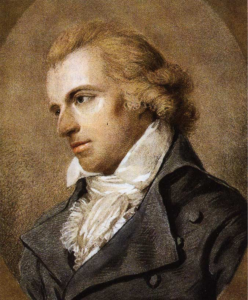Song
(Poet's title: Lied)
Set by Schubert:
D 284
[September 6, 1815]
Es ist so angenehm, so süß,
Um einen lieben Mann zu spielen,
Entzückend, wie ein Paradies,
Des Mannes Feuerkuss zu fühlen.
Jetzt weiß ich, was mein Taubenpaar,
Mit seinem sanften Girren sagte,
Und was der Nachtigallen Schar,
So zärtlich sich in Liedern klagte;
Jetzt weiß ich, was mein volles Herz
In ewig langen Nächten engte;
Jetzt weiß ich, welcher süße Schmerz,
Oft seufzend meinen Busen drängte;
Warum kein Blümchen mir gefiel,
Warum der Mai mir nimmer lachte,
Warum der Vögel Liederspiel
Mich nimmermehr zur Freude fachte:
Mir trauerte die ganze Welt,
Ich kannte nicht die schönsten Triebe.
Nun hab ich, was mir längst gefehlt,
Beneide mich, Natur – ich liebe!
It is so pleasant, so sweet,
To play about with a beloved man,
It is delightful, like a paradise,
To feel the man’s fiery kiss.
I now know what my pair of doves
Were saying with their gentle cooing,
And what the flock of nightingales
Was lamenting so affectionately in their songs.
I now know what my full heart
Was bothered by on endlessly long nights.
I now know what a sweet pain
It was that often pressed, sighing, on my breast.
Why no little flowers appealed to me,
Why May never smiled on me,
Why the birds’ song performances
No longer stirred up any joy in me:
The whole world was mournful for me,
I did not know the most beautiful impulses.
I now have what I was lacking for so long,
Envy me, nature, I am in love!
All translations into English that appear on this website, unless otherwise stated, are by Malcolm Wren. You are free to use them on condition that you acknowledge Malcolm Wren as the translator and schubertsong.uk as the source. Unless otherwise stated, the comments and essays that appear after the texts and translations are by Malcolm Wren and are © Copyright.
☙
Themes and images in this text:
Chest / breast Doves and pigeons Emptiness and fullness Fire Flowers Games and play Hearts Heaven, the sky Joy Kissing May Night and the moon Nightingales, Philomel Pain Sighs and sighing Songs (general)
Sometimes the penny drops. It clicks. You realise what other people had been talking about and what it is that you had been missing. If you are lucky, like the speaker in this poem, the moment of revelation is something fully positive. It shows that you are someone who is still open to new experience and to new understanding of old experiences; it breaks down barriers and it allows you to grow. It opens up a new part of your own psyche whilst also connecting you to others.
Some people interpret this type of readjustment as a conversion experience, perhaps in relation to religion or politics. For many, as for this speaker, it happens when they fall in love. Things that had been bland and dull begin to burst with taste and colour; new dimensions are opened up, allowing former viewpoints to be seen as limited perspectives. The passion for the other has transformed the self.
This poem captures that moment. Now is not the time to think too deeply about later moments of re-assessment and disillusionment: ‘How could I possibly have fallen for that?’ ‘How did I ever come to think that such an infatuation was true love?’
☙
Original Spelling Lied Es ist so angenehm, so süß, Um einen lieben Mann zu spielen, Entzückend, wie ein Paradies, Des Mannes Feuerkuß zu fühlen. Jetzt weiß ich, was mein Taubenpaar, Mit seinem sanften Girren sagte, Und was der Nachtigallen Schaar, So zärtlich sich in Liedern klagte; Jetzt weiß ich, was mein volles Herz, In ewiglangen Nächten engte; Jetzt weiß ich, welcher süße Schmerz, Oft seufzend meinen Busen drängte; Warum kein Blümchen mir gefiel, Warum der May mir nimmer lachte, Warum der Vögel Liederspiel Mich nimmermehr zur Freude fachte: Mir trauerte die ganze Welt, Ich kannte nicht die schönsten Triebe. Nun hab´ ich, was mir längst gefehlt, Beneide mich, Natur - ich liebe!
Confirmed by Peter Rastl with Schubert’s source, Friedrich Schillers sämmtliche Werke. Zehnter Band. Enthält: Gedichte. Zweyter Theil. Wien, 1810. In Commission bey Anton Doll, pages 263-264; and with Taschenbuch für Damen auf das Jahr 1809. Mit Beiträgen von Goethe, Lafontaine, Pfeffel, Jean Paul Richter, Schiller und andern. Tübingen in der J.G. Cotta’schen Buchhandlung, page 250.
This text has sometimes been attributed to Karoline von Wolzogen.
To see an early edition of the text, go to page 263 [269 von 310] here: http://digital.onb.ac.at/OnbViewer/viewer.faces?doc=ABO_%2BZ207858305


